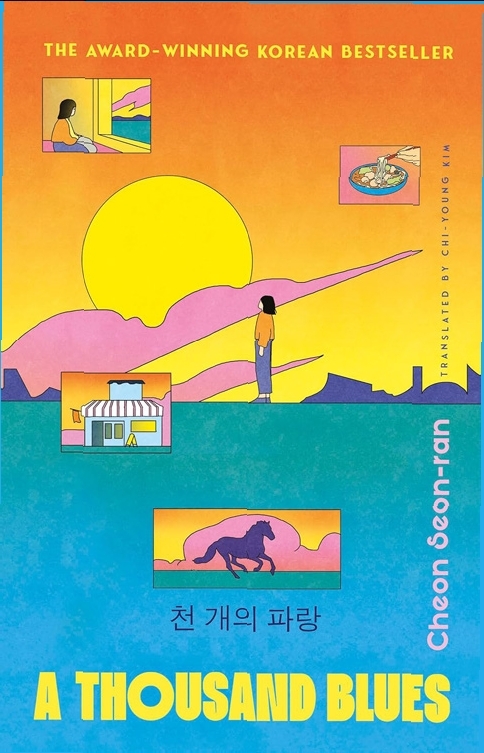
Imagine walking into your part-time convenience store job to find you’ve been replaced by Betty, a cutting-edge robot worker unfazed by long hours or rude middle-aged men. When you visit the convenience store a few months later, the robot is already past its prime, dented from bored teenage boys repeatedly kicking it as hard as they can. This is the world explored in “A Thousand Blues,” the 2020 science fiction novel from South Korean author Cheon Seon-ran, now available in an English translation by Chi-young Kim. The story set in 2035 centers on Yeonjae, a teenage robotics enthusiast, and her sister Eunhye, an animal lover who uses a wheelchair. When not helping out at their mother’s ginseng chicken soup restaurant, the girls like to spend time at the racetrack. This is where they meet Coli, a robot jockey who has been damaged and slated for destruction. When they learn that Today, their favorite racehorse, is due to be sent to the knacker’s yard, they hatch a plan to have Coli ride Today in a deliberately slow race. The book has many more serious themes beneath its engaging and readable surface: Everyone in the family has experienced rejection or been regarded as an outsider in some way, including Bogyeong, the girls’ mother, a former actress whose career ended after an accident left her face scarred. It’s no surprise then that this family forms bonds with Today and Coli. However, this is more than a tale of plucky underdogs with the odds stacked against them. It’s about those who get left behind in a world focused on novelty and efficiency. Robots have taken many human jobs but technology hasn’t been used to make spaces accessible for wheelchair users like Eunhye. The novel also explores the possibility of robotic consciousness and of human-robot relations, showing that Cheon’s worldview is peculiarly nuanced. Though the book’s back cover tells us “it’s only when we slow down that we can truly experience joy,” the book doesn’t simplistically extol the virtues of slowness and naturalness to the detriment of speed and technology. Coli — or C-27 to give the robot its original name — is, in fact, the book’s most touching character. Due to a mistake made by an exhausted and overworked researcher, Coli was given a more advanced brain chip and has been given the capacity of growing consciousness and human feelings. As an outsider, Coli looks on with curiosity and gentle bemusement at human behavior, at one point coming to the realization that each human being experiences time subjectively due to our biological nature. This engaging and subtly disturbing novel won the Korea Sci-fi Literature Award in 2019. | 
